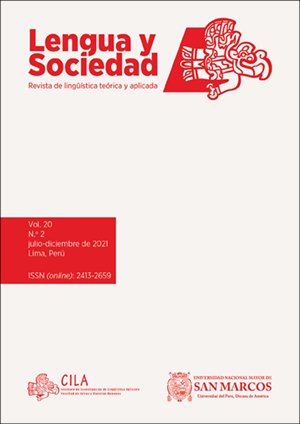The Social Management in the Universidad Nacional Intercultural de la Amazonía and its Relationship with the Implementation of an Educational Policy with an Intercultural Approach
DOI:
https://doi.org/10.15381/lengsoc.v20i2.22261Keywords:
social management, implementation, intercultural policy, linguistic diversity, higher education, UNIA universityAbstract
The implementation process of any policy or program is complex in itself and can present a series of factors that hinder its development. The establishment of an educational policy with an intercultural approach is no stranger to this, since —like any process— it must be implemented and then evaluated. This article intends to reflect on these forms of implementation carried out in a specific context: the National Intercultural University of the Amazon (UNIA), since it is known that it develops the intercultural approach as part of its long-term vision. To this end, we refer to the achievements and limitations that this system entails and present a proposal of axes and indicators for this management system that contribute to the implementation process of the intercultural approach. In addition, we emphasize the need to reformulate methodological teaching-learning strategies that consider as part of their contents the knowledge developed by the different native peoples existing in our country and the functioning and promotion of the language by native and non-native students. Finally, the UNIA has important achievements in its social management system; however, it needs to take into consideration issues such as capacity building, articulation with allied institutions, rethinking teaching - learning strategies and a curricular proposal that takes into consideration the linguistic and cultural situation of its students (treatment of languages, promotion of scientific research, among others).
References
Cerruto, L. (2009). La experiencia de la Universidad Indígena Intercultural Kawsay (UNIK).
Correa, N. (2011). Interculturalidad y políticas públicas: una agenda al 2016. Ediciones Nova Print SAC.
Cortázar, J. (2006). Una mirada estratégica y gerencial de la implementación de los programas sociales. Documentos de trabajo del INDES.
Cunningham, M. (2008). Educación indígena, interculturalidad y desarrollo autó- nomo. Nicaragua: Centro para la Autonomía y Desarrollo de los Pueblos Indígenas.
Gonzáles, V. (2016). Importancia de la interculturalidad en la formación docente. Recuperado de http://www.uch.edu.pe/uch-noticias/p/importancia-de-la-interculturalidad-en-la-formacion-docente
Lovón, M. A., Chávez, D., Yalta, E., & García, A.-M. (2020). La enseñanza de la lengua indígena y el desarrollo de la interculturalidad en las horas de clases de lengua nativa como L1 y L2 en el Perú. Boletín de la Academia Peruana de la Lengua, 67(67), 179-203. https://doi.org/10.46744/bapl.202001.006
Machaca, G. (2011). Demanda, situación y expectativas de los pueblos indígenas acerca de la educación superior en Bolivia. En Fundación EQUITAS, Inclusión Social, Interculturalidad y Equidad en la Educación Superior (52-87). Chile: Fundación EQUITAS.
Ponce, C. (2015). Lineamientosparauna Política de Educación Superior Intercultural. Instituto de Transferencias de Tecnologías Apropiadas para Sectores Marginales. Convenio Andrés Bello (ITACAB).
Primavera, H. (1997). Gerencia social y epistemología: reflexiones acerca de la construcción de herramientas de intervención. Recuperado de: http://www.econo.unlp.edu.ar/uploads/docs/gerencia_social_y_epistemologia_heloisa_ primavera.pdf
Universidad Nacional Intercultural de la Amazonía (2015). Plan Estratégico, 2015 al 2021. Recuperado de: http://www.unia.edu.pe/FrontEndUNIA/dw/transpa-rencia/transparencia.html
Universidad Nacional Intercultural de la Amazonía (2011). Currículo intercul- tural. Carrera Profesional de Educación Inicial Bilingüe. Recuperado de http://www.unia.edu.pe/FrontEndUNIA/dw/ArchivosPdfs/Plan.../plan-estudios-inicial.pdf
Downloads
Published
Issue
Section
License
Copyright (c) 2021 Zamia Ivon Castillo Farroñay

This work is licensed under a Creative Commons Attribution 4.0 International License.
AUTHORS RETAIN THEIR RIGHTS
a. Authors retain their trade mark rights and patent, and also on any process or procedure described in the article.
b. Authors can submit to the journal Lengua y Sociedad, papers disseminated as pre-print in repositories. This should be made known in the cover letter.
c. Authors retain their right to share, copy, distribute, perform and publicly communicate their article (eg, to place their article in an institutional repository or publish it in a book), with an acknowledgment of its initial publication in the journal Lengua y Sociedad.
d. Authors retain theirs right to make a subsequent publication of their work, to use the article or any part thereof (eg a compilation of his papers, lecture notes, thesis, or a book), always indicating its initial publication in the journal Lengua y Sociedad (the originator of the work, journal, volume, number and date).






